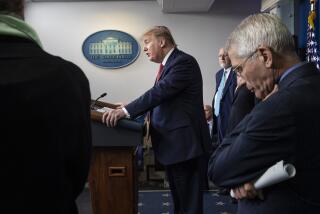Schiavo Taken Off Food Supply
- Share via
PINELLAS PARK, Fla. — With the simple act of removing a plastic feeding tube, doctors Friday began the slow process of ending Terri Schiavo’s life, a court-ordered move that trumped a day of legal maneuvers by congressional Republicans to prevent the death of the severely brain-damaged woman.
The procedure took place Friday afternoon inside a quiet hospice room north of St. Petersburg, while the world outside roiled. As a Roman Catholic priest administered last rites to Schiavo, 41, and demonstrators prayed nearby, national political leaders sparred over Congress’ unprecedented intervention into the battle over a woman whose story has roused the GOP’s social conservative base.
Over the course of a nerve-racking day, the leaders of two congressional committees summoned Schiavo, who doctors say is in a persistent vegetative state, to appear before lawmakers, an extraordinary attempt to stall the cutting-off of her food supply. A House lawyer flew to Florida to intervene in her case, only to be dismissed by a county judge who refused to retreat from his order to end Schiavo’s life. Invective mounted, with Democrats denouncing the legal moves and religious leaders fuming at the judge.
And after years of their own legal sparring over how to contend with Schiavo’s 15-year ordeal, her husband and parents spent time Friday inside the brick hospice where she lay. Without nutrition, Schiavo is expected to die in five to 10 days.
“This is what Terri wanted. This is her wish,” her husband, Michael Schiavo, said late Friday on CNN’s “Larry King Live.” He said he was angry that the government had “just trampled all over my personal life.”
David Gibbs, the lawyer for Bob and Mary Schindler, said Terri Schiavo’s parents were devastated. “They would change places with her in a heartbeat, if there was any way that they could be the one that’s sick and hurting, and give their health to Terri,” Gibbs said. “It’s a tough day for them.”
Over the last few days, Republican leaders in both houses of Congress -- responding to an outcry from the religious right -- passed legislation in an attempt to delay the removal of Schiavo’s feeding tube. Democrats questioned the propriety of the moves, while legal and medical experts struggled to keep pace with a raft of ethical questions raised by Congress’ intervention.
A House panel issued subpoenas to Schiavo, her husband and medical personnel. House Majority Leader Tom DeLay (R-Texas) and Senate Majority Leader Bill Frist (R-Tenn.) said they and other GOP leaders would work over the weekend to smooth out conflicts between the Senate and House bills that would allow federal courts to intervene in the Schiavo case.
Late Friday, the Supreme Court denied without comment an emergency House request to reinsert Schiavo’s feeding tube while it appealed to have its subpoenas recognized.
White House officials said President Bush discussed the case with his brother, Florida Gov. Jeb Bush, during a stop in Pensacola, Fla. White House spokesman Scott McClellan declined to detail the conversation, but said that “the president believes that when there are serious questions or doubts in a case like this, that the presumption ought to be in favor of life.”
But despite those efforts -- and even a direct attempt Friday by a lawyer for the House Committee on Government and Reform to serve Schiavo with a subpoena -- the Florida judge overseeing her fate pressed ahead with his order granting Michael Schiavo’s request to let her die.
“I have no cogent reason why the [House] committee should intervene,” state Circuit Judge George W. Greer told attorneys in a conference call.
Schiavo has been in a vegetative state since 1990; she suffered brain damage after a chemical imbalance caused her to stop breathing temporarily. She can breathe on her own, but cannot speak or eat.
Schiavo left no will, but her husband has said that she did not wish to be kept alive through artificial means. The Schindlers maintain that their daughter has been misdiagnosed and could improve with therapy.
Five years ago, Greer approved a request by Michael Schiavo to remove her feeding tube. But legal appeals by her parents -- and maneuvering by Florida legislators and Gov. Bush -- delayed the move until the U.S. Supreme Court refused in January to intervene.
At 1:45 p.m Friday, on Greer’s latest order, doctors and hospice workers disconnected the thin plastic tube that carried liquid nourishment directly into Schiavo’s stomach.
Michael Schiavo was not present because he was emotionally unable to attend, lawyer George Felos said, but he arrived minutes later. Terri Schiavo’s parents had been at her bedside earlier in the day, but were asked by officials to leave before the tube was shut off.
After the procedure was complete, Felos launched into a caustic attack on Republican leaders, describing their subpoenas directed to the Schiavos as “nothing short of thuggery.”
“Apparently, according to the House of Representatives, any committee member can direct a subpoena to any American citizen, forcing them to have medical treatment against their will,” Felos said. “It was odious. It was shocking.”
DeLay said House Republicans would not be deterred by Friday’s events. He called Greer’s order “barbaric” and cited Felos as “the personification of evil.”
Early Friday, Frist announced that the Schiavos would be summoned to Washington as part of a Senate Health Committee probe into the handling of the case.
Frist took action after Senate Republicans were unable to pass a bill Thursday that was in line with the House legislation. Several senators had complained that the House bill was too broad, and DeLay accused several Democratic senators of “cowardice” in opposing the effort.
Under federal law, Frist said, witnesses called to appear before Congress are protected from “anyone who may obstruct or impede a witness’ attendance” -- a reference to the order to shut off Schiavo’s food supply.
Frist, a physician who is considered a possible Republican presidential candidate in 2008, said Congress remained “dedicated to saving Terri Schiavo’s life.” He earlier had insisted that after a review of videotapes of Schiavo, he had found that she might not be in a persistent vegetative state -- a requirement crucial in any order to cut off nutrition.
But right-to-die supporters have insisted that only a few snippets of videotape show any animation from Schiavo, whereas hours of footage portray her in a near-motionless state. And some ethicists questioned whether Frist could have properly drawn his conclusion from only reviewing videotapes.
The Senate summons was followed quickly by the House subpoenas.
DeLay and other House leaders said they were issuing subpoenas to “require hospital administrators and attending physicians to preserve nutrition and hydration for Terri Schiavo to allow Congress to fully understand the procedures and practices that are currently keeping her alive.” The fight, they insisted, “is not over.”
The move prompted an angry reaction from Rep. Henry A. Waxman of Los Angeles, ranking Democrat on the Government Reform Committee. Calling the subpoenas a “flagrant abuse of power,” Waxman said the Republican move “is turning the Schiavo family’s personal tragedy into a national political farce. The committee has no business inserting itself in the middle of an excruciating private family matter.”
Waxman called the subpoenas unenforceable, but a House committee lawyer flew to Florida on Friday morning hoping to persuade the judge to issue a nine-day postponement.
But in the conference call with lawyers, Greer announced that he was turning aside congressional intervention and saw no reason to further delay disconnecting Schiavo’s feeding tube.
Legal and medical ethicists were divided Friday over the propriety of the subpoenas. “Dubious and untested,” said John Robertson, a University of Texas at Austin law professor who specializes in medical ethics. “From Republicans who try to be very protective of states’ rights, here is a case where Congress is trampling on a state court’s decision.”
But Adrienne Asch, a bioethics professor at Wellesley College in Massachusetts, suggested there are “real problems in this case” and echoed concerns of many social conservative leaders that “a spouse is no longer the best decision maker.”
The Rev. James C. Dobson, head of the politically powerful Focus on the Family, lashed out at Greer’s “defiance in ignoring federal subpoenas,” accusing the judge of hubris. And Richard Land, a top official of the Southern Baptist Convention, called Greer’s order “barbarous and cruel.”
But nowhere was the rhetoric more agitated than just outside the walls of the Woodside Hospice.
There, about 100 demonstrators knelt and prayed for the woman they have seen only in brief video clips. Some fingered rosaries. Others wore bright-red tape over their faces with the message: “Life.”
The protesters carried a life-sized crucifix and signs like one that read: “Terri is a precious jewel.” Across the street, a smaller group of about a dozen right-to-die advocates had their own message: “The religious right is America’s Taliban.”
“We’d like to set her free,” said Leddy Hammock, 58, a clergywoman at the Unity Church of Clearwater in Florida.
But Hammock and her group were overshadowed by protesters like Kathleen Musick, 53, a Pinellas Park woman who showed up to pray for Schiavo in a wheelchair because of a recent foot injury.
“I think this is a terrible injustice,” Musick said. “When dolphins get sick, we take more care of them than of her.”
Nearby stood Randall Terry, the religious activist who made a name for himself a decade ago as an antiabortion tactician. Terry, who has taken up Schiavo’s cause, vowed to mobilize his followers to rescue her, even camping out on Gov. Bush’s doorstep if necessary.
“It’s time to take the gloves off,” Terry said.
*
(BEGIN TEXT OF INFOBOX)
Years of debate
A timeline of events in the Terri Schiavo case:
February 1990: Terri Schiavo collapses in her home, possibly from a potassium imbalance, temporarily stopping her heart and cutting off oxygen to her brain.
November 1992: Schiavo’s husband, Michael, wins more than $1 million in a malpractice suit.
July 1993: Upset over Terri Schiavo’s care and the lawsuit money, her parents, Bob and Mary Schindler, try to have Michael removed as Terri’s guardian. The case is dismissed.
February 2000: Circuit Judge George W. Greer approves Michael Schiavo’s request to have Terri’s feeding tube removed.
April 2001: The Florida and U.S. Supreme Courts refuse to intervene, and Terri Schiavo’s tube is removed, but another judge orders it reinserted two days later.
February 2002: Mediation attempts fail, and Michael Schiavo again seeks permission to remove the feeding tube.
November 2002: After hearing medical testimony, Greer finds no evidence that Terri Schiavo has any hope of recovery and again orders the tube removed.
October 2003: The tube is removed for a second time. Florida Gov. Jeb Bush signs a bill allowing him to intervene, then orders the tube reinserted.
December 2003: An independent guardian finds “no reasonable medical hope” that Schiavo will improve.
September 2004: The Florida Supreme Court strikes down “Terri’s Law” as unconstitutional.
Feb. 25, 2005: After declining to give the Schindlers more time to pursue other legal and medical options, Greer gives permission for tube removal at 1 p.m. March 18.
March 16: The U.S. House passes a bill aimed at keeping Schiavo alive.
March 17: The Florida House passes a bill intended to keep Schiavo alive; the U.S. Senate passes a bill different from the U.S. House version.
March 18: The feeding tube is removed. Greer rules against congressional Republicans who had tried to put off tube removal by seeking Schiavo’s appearance at hearings.
Source: Associated Press
Dahlburg reported from Pinellas Park and Simon from Washington. Times staff writers Stephen Braun and Ricardo Alonso-Zaldivar in Washington contributed to this report.
More to Read
Sign up for Essential California
The most important California stories and recommendations in your inbox every morning.
You may occasionally receive promotional content from the Los Angeles Times.











